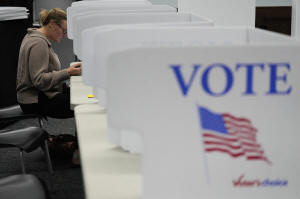Court restricts who can bring voting rights challenges in a case
involving voters with disabilities
[July 29, 2025]
By GARY FIELDS
WASHINGTON (AP) — A federal appeals court panel on Monday ruled that
private individuals and organizations cannot bring voting rights cases
under a section of the law that allows others to assist voters who are
blind, have disabilities or are unable to read.
It's the latest ruling from the St. Louis-based 8th Circuit Court of
Appeals, saying only the government can bring lawsuits alleging
violations of the Voting Rights Act. The findings upend decades of
precedent and will likely be headed to the U.S. Supreme Court.
The case centered on whether an Arkansas law that limits how many voters
can be assisted by one person conflicts with Section 208 of the landmark
federal law.
The opinion from the three-judge panel followed the reasoning of another
8th Circuit panel in a previous case from 2023. That opinion held that
the Arkansas State Conference NAACP and the Arkansas Public Policy
Conference could not bring cases under Section 2 of the Voting Rights
Act.
“Like the provision at issue in Arkansas State Conference, we conclude
the text and structure of (Section) 208 do not create a private right of
action,” said the decision written by Judge L. Steven Grasz, a nominee
of President Donald Trump. “Likewise, we conclude no private right of
action is created by the Supremacy Clause.”

In the previous case, the district court judge said he could not reach
an opinion on the merits because the plaintiffs did not have standing
under Section 2 and gave the Justice Department five days to join the
case. The circuit court panel agreed with his reasoning in a 2-1
decision.
The 8th Circuit, which covers Arkansas, Iowa, Minnesota, Missouri,
Nebraska, North Dakota and South Dakota, has issued three rulings
holding that individuals and private entities don't have standing to
bring challenges against voting laws. The other came in May in a lawsuit
over North Dakota redistricting.
In that case, the Spirit Lake Tribe and Turtle Mountain Band of Chippewa
Indians, with reservations 60 miles apart, argued that the state’s 2021
legislative map violated the Voting Rights Act by diluting their voting
strength and ability to elect their own candidates.
[to top of second column]
|

Whitney Cooper casts her ballot on Election Day, Nov. 5, 2024, in
Canton, N.C. (AP Photo/George Walker IV, file)

The appeals court ruled in a 2-1 decision that only the U.S.
Department of Justice could bring such lawsuits, and the full
circuit declined to take up the case. The U.S. Supreme Court blocked
the ruling last week while it decides whether to hear the case.
The Justice Department declined to comment on whether it would be
intervening in the Arkansas case. It earlier declined to comment on
the case involving the two North Dakota tribes.
Arkansas Attorney General Tim Griffin applauded the decision by the
8th Circuit panel, saying the 2009 state law revolving around voters
with disabilities “protects the right to vote free from undue
influence or manipulation.” In the statement, he said Monday's
ruling “means that officials can continue to enforce Arkansas’s laws
and voters can have confidence in our elections.”
The Mexican American Legal Defense Fund, which is representing the
plaintiffs in the lawsuit, declined to comment.
Sophia Lin Lakin, director of the Voting Rights Project for the
ACLU, said she wasn't surprised by the ruling given the decisions in
the earlier cases.
“I think it’s important to keep focus on the fact that the 8th
Circuit’s decisions are radical and completely at odds with decades
of precedent, including from the Supreme Court itself, as well as
the text, history and purpose of the Voting Rights Act,” said Lakin,
who was one of the attorneys in the initial Arkansas State
Conference case. “Private litigants have been the engine of
enforcement of the Voting Rights Act for sixty years.”
Section 2 is considered one of the more consequential parts of the
Voting Rights Act that remains intact, after a 2013 Supreme Court
decision removed Section 5. That section required that all or parts
of 15 states with a history of discrimination in voting get approval
from the federal government before changing their voting and
election laws.
All contents © copyright 2025 Associated Press. All rights reserved |